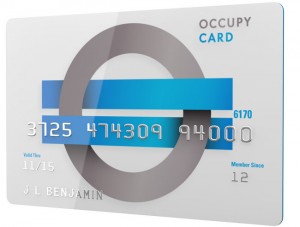By now some of you may have heard about the forthcoming “Occupy Wall Street” debit card:
To mark the second anniversary of the Occupy Wall Street movement last month, an assortment of protests, marches and rallies were held, to support or oppose mostly predictable causes.
At the same time, a far more surprising undertaking began with far less fanfare: creating a prepaid Occupy debit card.
The idea, led by a group that includes a Cornell law professor, a former director of Deutsche Bank and a former British diplomat, is meant to serve people who do not have bank accounts, but it also aims to make Occupy a recognized financial services brand.
On Sept. 17, the day of the anniversary, the group, known as the Occupy Money Cooperative, began raising money to pay for initial operating expenses. The group’s Web site invites visitors to “join the revolution,” suggesting that using the card might represent a “protest with every purchase.”
It’s an interesting idea, and I say that in a non-patronizing, non-sarcastic, non-ironic way. I certainly respect them for putting their money where their mouth is. It’s easy to criticize this sort of thing–and we’ll get to the criticism in a moment–but first of all you have to acknowledge that regardless of your political views, some respect is due to anybody who takes a stab at mustering together the human, social, and technological capital required to launch a product like this. Starting up a bank or a bank-like entity is not easy.
And yet…
Let’s look at the Occupy Money Cooperative in its own words. According to the card’s website:
The Occupy Money Cooperative will provide people with access to low cost financial services. The first service will be The Occupy Card. It’s a low cost, full featured pre-paid debit card with a transparent fee structure.
They mentioned “low cost” twice in the first paragraph, so the cost of this card is presumably quite low. There’s more:
This card will directly tackle the concerns of the unbanked and the underbanked. Users of the Occupy Card will be able to participate in the cashless economy at a significantly lower cost.
The Occupy Card will be a highly useful, high-quality product, based on an innovative concept and platform. Many will see the Card as “A Protest with Every Purchase” but the card isn’t only for Occupy supporters. People who are unbanked, underbanked, and even just angry-banked will all benefit from using the Card because it is a better and more affordable product.
They’re making strong claims. Do they back them up?
Unfortunately, the answer is no. Take a look at their fee structure for yourself. It’s not terrible… but it’s not great. There’s a monthly fee, there are fees for doing online billpay, there are fees for checking your balance at an ATM.
Compare their fees to the Bluebird prepaid debit card. Bluebird is issued by American Express, which is headquartered just a few blocks from Wall Street. Bluebird doesn’t have any of those fees. It’s probably the most fee-free prepaid card out there. They’ve even been giving away checkbooks for free. It is equal or superior to the Occupy card in every way.
Is the Occupy card really “better and more affordable”? Compared to some of the more egregious fee-collectors out there, yes. Compared to the better prepaid cards, certainly not.
One item which may be of interest to readers of this blog, however: according to the fee schedule, you’ll be able to load it with a credit card for $2.80. Hmmm….

LMAO, can’t wait to be a part of it. 🙂
Looks like you can use credit card only once a year. Any idea on when you can sign up?
Regarding credit card loading, the site wasn’t clear to me–I interpreted it as saying that the average user would load via CC once per year, not that that was the maximum number of times, though your interpreation also crossed my mind.
Regarding when can you sign up, the article said they’ll start issuing cards once they’ve raised $900K for startup costs.
That is my interpretation as well, on average the user would load via CC once per year. @ $2.80/load it could be make generating points cheaply depending on the max